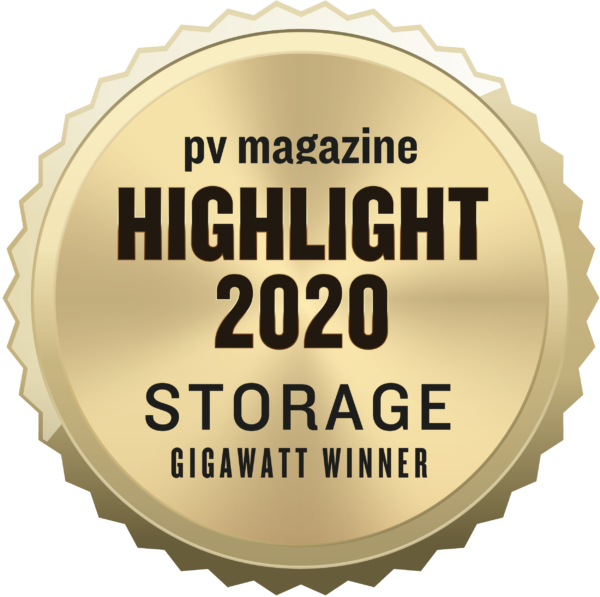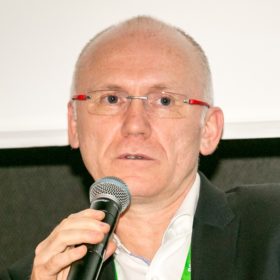Built in partnership with Messe Düsseldorf and Energy Storage Europe, pv magazine’s annual Energy Storage Highlights 2020 special edition is hot off the press. Celebrate this year’s top five awardees at our Insight panel session with discussion among our Gigawatt winners and panel of expert jurors.
Introducing our third Gigawatt Winner… 
sonnen
An electric car subscription model for PV and storage system customers
sonnen presents a business model that makes switching to an electric car easy, promotes solar power charging, and advances the market for storage systems. The next big step could be integrating the vehicles into virtual power plants of distributed home storage systems, which the company has operated on the German frequency containment reserve market for the past year.
Can an entry that is only indirectly related to energy storage be among the top 5 Storage Highlights and thus be one of the Gigawatt Winners? And what does that show us? sonnen’s electric vehicle (EV) subscription model in Germany, similar to those for PV and storage systems, was well received by the judges – even more so than the virtual power plant based on the manufacturer’s many distributed battery home storage systems, which sonnen also submitted.
Customers who sign up for an electric car subscription through the new “sonnenDrive” service save up-front costs just as they would if they rented a PV system with storage instead of buying – a plan offered under the name “sonnenNow.” sonnen Managing Director Christoph Ostermann wants to lower barriers to entry for individuals in order to advance the energy transition.
To achieve this goal, he had to aim at a monthly cost for the rental models that would be on the same level for customers as if they simply did nothing at all – that is, subscribing to the models had to be comparable with continuing to purchase electricity from a power company and driving an old car that runs on gasoline. “People who don’t make the switch with our new service simply don’t want to,” he says.
With the business model, the minimum term for the electric car subscription is only six months, compared to two years or more with leasing contracts, which allows customers to just give it a try. However, the car subscription is contingent on joining the solar community and purchasing electricity from it. According to sonnen, this means switching primarily to solar energy.
The subscription model for PV systems with storage runs for 20 years, but the system can be purchased out at any time. After 20 years, it is turned over to the customer free of charge. It differs from the widely available rental offers for PV systems in that it is provided with a flat rate, so that it covers the full electricity needs of the house.
pv magazine Storage Highlights Ceremony
Now as a Webinar!
You are invited to join us online for the pv magazine Storage Highlights Ceremony on March 11, 10am – 11:30am (CET)!
The Energy Storage Europe Düsseldorf has been postponed indefinitely due to Coronavirus. Consequently, we will not be able to host our Insight event live onsite. However, in the age of digitalization we will host the Storage Highlights Ceremony as a webinar.
The five Gigawatt Winners will pitch their winning applications to the expert jury panel with a subsequent discussion by the independent leading analysts.
Whether these models are transferrable to other countries cannot be answered, as they are highly dependent on feed-in tariffs and incentive programs. In the United States, rental models for photovoltaics have been very successful in the past. That has been due to the fact that up-front investment costs for such systems were very high, and also because end users were typically unable to take full advantage of ITC/MACRS benefits under direct ownership, so third-party ownership was encouraged, says Florian Mayr of Apricum, one of the energy storage highlights jurors. Conversely, since there is still a feed-in tariff in Germany and self consumption is exempt from levies for systems below 10 kW, end customers can also operate systems themselves relatively easily.
Popular content
Ostermann admits that every rental model includes interest. People who have sufficient money at their disposal, for which they get paltry interest rates at the bank, can invest. But the subscription models are particularly attractive for young families whose houses are not yet paid off, he says.
The virtual power plan
sonnen also submitted an entry for its virtual power plant (VPP) – which it created from its network of battery home storage systems – to pv magazine for the energy storage highlights competition. Prequalified by the transmission system operators in Germany in autumn 2018, the virtual power plant has been participating in auctions for primary balancing power, also known as the frequency containment reserve market (FCR) market, since spring 2019. The proceeds, according to sonnen, will benefit owners of its home storage systems who have signed onto “sonnenFlat” as their electricity rate in Germany. In principle, the primary balancing power provided by battery storage systems will be needed if conventional power plants are to be decommissioned one day. At present, they still provide only a fraction of primary control power.
For the virtual power plant, sonnen has to control home storage systems based on power grid requirements. According to the company, this type of system is competitive with larger battery storage facilities, which already offer significant capacity to the primary balancing power market. The primary purpose of small home power storage systems is to increase household consumption, whereas marketing them as VPPs is more for an additional source of revenue, to lower costs. Secondly, the use of home storage systems can cut out some of the phases of planning and construction and do not require the same land necessary for large utility-scale storage plants. They also have the advantage of a lower environmental impact compared to that of a large power storage facility. Furthermore, hardly any intervention in charging and discharging the storage systems themselves seems to be necessary. Since many more storage systems are combined in the pool than the amount of power marketed, statistically there is always enough energy available in the VPP, explains the company.
In itself a great achievement, the VPP is not anything completely new, say experts. The concept has been around for several years and sonnen has been working on it for quite some time. According to the jurors, the challenge in Germany stemmed primarily from complex regulations and the resulting prequalification. In other countries, such a concept is easier to implement and has therefore been in place for some time. For example, sonnen also operates a VPP in Australia. There, unlike in Germany, it is used to compensate for price differences on the spot energy market as well.
The fact that the VPP in this highlight competition has now been overshadowed by the electric car business model also shows how interlinked these segments have become, and how transport and generation have become two sides of the same coin. Ultimately, a comprehensive offer that combines electromobility, photovoltaics, and battery storage will help to advance the storage market, as well as charge electric cars that use solar power, say the jurors. In the next step, combining sonnen’s electric car service and its VPP could be on the way: in principle, the battery storage capacity of the electric cars could be used as a virtual power plant to stabilize the grid. Many experts consider this combination to have very high potential.
Jury comments
Florian Mayr: “sonnen’s leasing and subscription models have the potential to significantly lower the entry barriers to rooftop PV, residential storage and electric mobility. By avoiding upfront costs, a broader share of the population – beyond the early adopter market – is likely to be attracted to actively participate in both the energy and transport transitions.”
James Frith: “By providing a subscription model for EVs, alongside its PV and storage subscriptions, sonnen is helping to increase access to EVs. It also enables customers to have the greenest possible experience with their EV by charging from their solar systems.”
Mark Higgins: “Business model innovation is key to accelerating the energy transition, and sonnen’s model is a consumer-friendly approach that is poised to open up new markets.”
Julian Jansen: “In a market being historically product focused, the provision of new customer-centric, service based business models will be pivotal in unlocking value for the utility of the future.”
Jurors
This content is protected by copyright and may not be reused. If you want to cooperate with us and would like to reuse some of our content, please contact: editors@pv-magazine.com.








2 comments
By submitting this form you agree to pv magazine using your data for the purposes of publishing your comment.
Your personal data will only be disclosed or otherwise transmitted to third parties for the purposes of spam filtering or if this is necessary for technical maintenance of the website. Any other transfer to third parties will not take place unless this is justified on the basis of applicable data protection regulations or if pv magazine is legally obliged to do so.
You may revoke this consent at any time with effect for the future, in which case your personal data will be deleted immediately. Otherwise, your data will be deleted if pv magazine has processed your request or the purpose of data storage is fulfilled.
Further information on data privacy can be found in our Data Protection Policy.